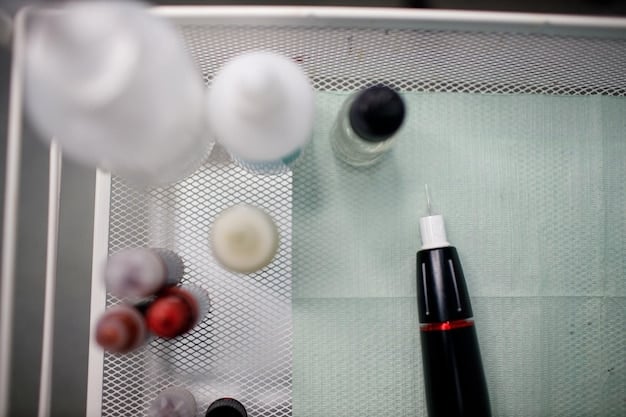Is Your Skincare Routine Sabotaging Your Facial Aesthetics Treatments? Find Out Now

Is Your Skincare Routine Sabotaging Your Facial Aesthetics Treatments? Find Out Now: Discover how your daily skincare habits might be hindering the effectiveness of facial aesthetics treatments, leading to unexpected complications or less-than-optimal results, and learn how to adjust your regimen for better outcomes.
Are you investing in facial aesthetics treatments but not seeing the results you expect? Your daily skincare routine, which you believe is helping, may actually be the culprit. Let’s explore how your current habits could be unknowingly sabotaging your efforts and what you can do to ensure your treatments deliver the best possible outcomes.
Understanding Facial Aesthetics Treatments
Facial aesthetics treatments are designed to enhance your natural beauty and address various skin concerns, from wrinkles and fine lines to volume loss and uneven skin tone. These treatments range from non-invasive procedures like chemical peels and microdermabrasion to minimally invasive options like Botox and dermal fillers.
Types of Facial Aesthetics Treatments
Understanding the different types of treatments available is key to knowing how your skincare routine might interact with them. Each treatment has specific requirements and potential sensitivities that need to be considered.
- Botox and Dermal Fillers: Injections that reduce wrinkles and restore volume.
- Chemical Peels: Exfoliate the skin to improve texture and tone.
- Laser Treatments: Address issues like pigmentation, wrinkles, and scars.
- Microdermabrasion: Gentle exfoliation to remove dead skin cells.
Choosing the right treatment for your skin type and concerns is crucial. Proper preparation and aftercare are essential for achieving the best results and minimizing potential side effects.

Common Skincare Mistakes That Can Hinder Results
Many people are unaware that their well-intentioned skincare routines may be doing more harm than good when combined with facial aesthetics treatments. Certain products and habits can interfere with the healing process, increase sensitivity, or even negate the effects of the treatment.
Over-Exfoliation
While exfoliation is important, overdoing it can compromise your skin’s barrier function, making it more susceptible to irritation and damage.
Using Harsh Actives
Ingredients like retinoids, AHAs/BHAs, and strong vitamin C serums can be too aggressive, especially after a treatment that already sensitizes the skin.
- Retinoids: Increase cell turnover but can cause dryness and peeling.
- AHAs/BHAs: Exfoliate chemically and can irritate sensitive skin.
- Strong Vitamin C Serums: Provide antioxidant benefits but can be acidic.
Avoiding these ingredients for a period before and after your facial aesthetics treatment can help prevent adverse reactions and ensure optimal healing.
The Impact of Ingredients on Treatment Outcomes
The ingredients in your skincare products can significantly impact the results of your facial aesthetics treatments. Some ingredients may enhance the effects, while others can diminish or even reverse them.
Ingredients to Avoid
Certain ingredients can cause inflammation, irritation, or photosensitivity, which are detrimental to treatment outcomes.
- Alcohol-Based Products: Can dry out the skin and delay healing.
- Fragrances and Dyes: Common irritants that can cause allergic reactions.
- Sulfates: Harsh cleansers that strip the skin of its natural oils.
Carefully reading labels and opting for gentle, fragrance-free products can make a big difference in how your skin responds to treatments.

How to Adjust Your Skincare Routine Pre- and Post-Treatment
Adjusting your skincare routine before and after facial aesthetics treatments is crucial for maximizing results and minimizing complications. A tailored approach can prepare your skin for the procedure and support its recovery afterward.
Pre-Treatment Skincare
In the weeks leading up to your treatment, focus on gentle hydration and barrier repair.
Hydration is key to prepping your skin. Use hydrating serums with hyaluronic acid.
Consider consulting with a skincare professional to create a personalized pre-treatment plan.
Post-Treatment Skincare
After your treatment, prioritize soothing and protecting your skin.
- Gentle Cleansing: Use a mild, non-foaming cleanser.
- Hydration: Apply hydrating serums and moisturizers.
- Sun Protection: Wear a broad-spectrum sunscreen daily.
Remember to follow any specific instructions provided by your aesthetician or dermatologist to ensure proper healing and optimal results.
Building a Synergistic Skincare Regimen
Creating a skincare routine that complements your facial aesthetics treatments involves choosing products that support and enhance their effects. This approach can extend the longevity of your results and improve your overall skin health.
Focus on Hydration
Hydrated skin is better able to heal and maintain its elasticity and plumpness.
Use hyaluronic acid serums and moisturizers with ceramides.
Avoid products that strip the skin of its natural oils.
Incorporate Antioxidants
Antioxidants protect the skin from free radical damage and promote collagen production.
- Vitamin C (Gentle Formulas): Brightens and protects.
- Vitamin E: Moisturizes and provides antioxidant benefits.
- Green Tea Extract: Soothes and reduces inflammation.
Choosing products with these ingredients can help maintain the health and vitality of your skin between treatments.
Seeking Professional Guidance
Consulting with a skincare professional is invaluable for creating a customized skincare routine that works in harmony with your facial aesthetics treatments. They can assess your skin’s specific needs and recommend products and practices that will optimize your results.
Working with a Dermatologist
A dermatologist can provide expert advice on the best treatments and skincare products for your skin type and concerns.
They can also help you manage any potential side effects or complications from your treatments.
A personalized approach is usually the most effective strategy.
Collaborating with an Aesthetician
Aestheticians can offer valuable insights into maintaining your skin’s health and appearance between treatments.
They can recommend specific products and techniques to support your skin’s recovery and enhance your results.
Always seek the advice of a professional.
| Key Point | Brief Description |
|---|---|
| 🚫 Avoid Over-Exfoliation | Over-exfoliating can irritate and damage the skin, hindering treatment outcomes. |
| 🧪 Limit Harsh Actives | Ingredients like retinoids and strong acids can be too aggressive, causing adverse reactions. |
| 💧 Focus on Hydration | Hydrated skin heals better and maintains elasticity, improving treatment results. |
| ☀️ Use Sun Protection | Sunscreen is crucial to protect treated skin from damage and maintain long-term results. |
Frequently Asked Questions
▼
After a chemical peel, avoid retinoids, AHAs/BHAs, and harsh exfoliants. These can irritate the skin and hinder the healing process. Focus on gentle hydration and sun protection.
▼
It’s best to avoid using retinol immediately after Botox. Allow your skin to recover for at least a week before reintroducing retinol to prevent irritation and ensure optimal Botox results.
▼
Wait until your skin has fully healed before applying makeup after laser treatment, usually around 5-7 days. Use mineral-based makeup to minimize irritation and avoid infection.
▼
Use a gentle, non-foaming cleanser that is free of sulfates and fragrances after any facial aesthetic treatment. This will help cleanse the skin without stripping it of its natural oils.
▼
Sunscreen is crucial because facial aesthetics treatments often make your skin more sensitive to the sun. Protecting your skin with broad-spectrum SPF helps prevent damage and maintain treatment results.
Conclusion
Your daily skincare routine can significantly impact the effectiveness of your facial aesthetics treatments. By understanding which ingredients and habits to avoid and adopting a synergistic approach, you can ensure your treatments deliver the best possible results. Prioritizing gentle hydration, sun protection, and professional guidance will pave the way for healthier, more radiant skin.





